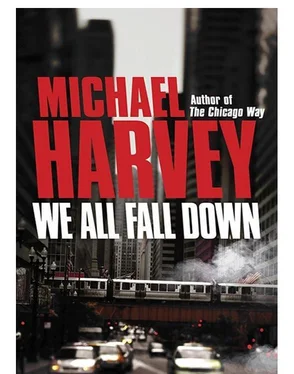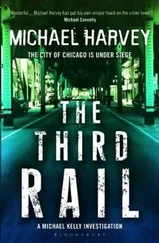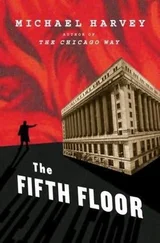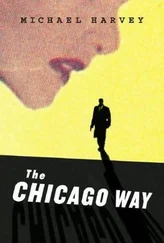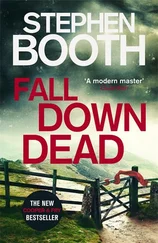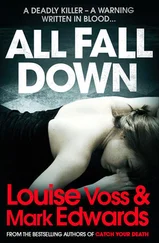Michael Harvey - We All Fall Down
Здесь есть возможность читать онлайн «Michael Harvey - We All Fall Down» весь текст электронной книги совершенно бесплатно (целиком полную версию без сокращений). В некоторых случаях можно слушать аудио, скачать через торрент в формате fb2 и присутствует краткое содержание. Жанр: Полицейский детектив, на английском языке. Описание произведения, (предисловие) а так же отзывы посетителей доступны на портале библиотеки ЛибКат.
- Название:We All Fall Down
- Автор:
- Жанр:
- Год:неизвестен
- ISBN:нет данных
- Рейтинг книги:5 / 5. Голосов: 1
-
Избранное:Добавить в избранное
- Отзывы:
-
Ваша оценка:
- 100
- 1
- 2
- 3
- 4
- 5
We All Fall Down: краткое содержание, описание и аннотация
Предлагаем к чтению аннотацию, описание, краткое содержание или предисловие (зависит от того, что написал сам автор книги «We All Fall Down»). Если вы не нашли необходимую информацию о книге — напишите в комментариях, мы постараемся отыскать её.
We All Fall Down — читать онлайн бесплатно полную книгу (весь текст) целиком
Ниже представлен текст книги, разбитый по страницам. Система сохранения места последней прочитанной страницы, позволяет с удобством читать онлайн бесплатно книгу «We All Fall Down», без необходимости каждый раз заново искать на чём Вы остановились. Поставьте закладку, и сможете в любой момент перейти на страницу, на которой закончили чтение.
Интервал:
Закладка:
“It’s in the basement,” I said, and pointed the way. Johnny took out his gun and insisted I go first. The door to the cellar was unlocked. I pushed it open. The black duffel bag with gold trim was right where I’d left it. Johnny Apple tucked his gun into his belt and zipped the bag open.
“It’s the dope Gilmore lifted from the Korean. I counted twenty-six kilos. The Fours already took delivery on number twenty-seven. Pretty much makes your boss whole.”
Johnny zipped up the bag and carried it out to the car, where he locked it in the trunk beside Gilmore. Then he climbed behind the wheel.
“You hear me, Johnny?”
“I heard you. Not sure if my boss is gonna hear you. You understand what I’m saying?”
“I do. And I think I can live with it.”
“We’ll see. Be good, Kelly.”
“Bye, Johnny.”
Johnny Apple drove off the lot and disappeared around a corner. The rain had stopped, and the sky had cleared. I sat on the black iron stairs and had another smoke. Watched the muddy parking lot dry in the early afternoon sun. After a while I went up the stairs and walked through Gilmore’s computer a second time. Then a third. When I had what I needed, I slipped out the back door, found my own car, and left.
LOOSE ENDS
CHAPTER 59
The crisis ended with a press conference. After seventy-two hours with no new infections, the feds linked arms with the mayor and took a collective bow. There was a lot of vague talk about vaccines. Sixty Minutes ran a piece on CDA Labs and the emerging bioterror-industrial complex. The reality, however, was that the pathogen had just expired. Apparently of natural causes. No one seemed to understand why. And, for the moment anyway, no one really cared. Immediately after the press conference, work crews began to dismantle the quarantine fences. And the backlash began.
BioKatrina, the press called it. From the White House to City Hall. A core meltdown at all levels of government. The New York Times ran a piece offering a glimpse inside Chicago’s quarantine zones. Three hundred forty-three dead from the pathogen. Another two hundred from the dogs the pathogen let loose. There were just a few pictures that got through the government net, but the Times had them. A block of buildings reduced to chunks of rock and raw timber. Three bangers on “patrol,” smiling and pointing guns at the camera. A single body, curled in an alley, while residents, faces and mouths covered, picked through the deceased’s effects. This was America, the editorial intoned. This was ourselves.
The piece got a lot of attention for a day or two. Then was forgotten. And why not? There was money to be spent. Money to be made. Talk show hours to fill. Fresh blood in the water.
The finest minds would be enlisted. Billions pledged to the effort. It was the challenge for a generation. Render America a fortress. Impervious to a second biological attack.
I watched it all on TV, sitting among crates of booze in a single room above my local, an Irish bar called the Hidden Shamrock. I kept an eye on who got nervous. Who got their names in headlines. And who didn’t show up at all.
On the day I killed Gilmore, Molly had hit my cell five times. After that, it was mostly no one. Except the mayor’s office. And Rachel. I didn’t answer any of them. Save one.
On the second day, I got my shoulder patched. Then I drove north on Lake Shore Drive until it ended. I snaked along Sheridan, through Rogers Park and into Evanston. The folks at Northwestern were more than helpful. I knew what I wanted and found it exactly where I thought it might be. The registrar’s office was even kind enough to make copies for me.
On the morning of day three, the politicians held their press conference. I arrived at Grant Park just after five that afternoon. They were expecting a couple hundred thousand people and got almost a million, spread out on the same patch of ground where Obama had held his rally on the night he was elected. As darkness settled over the city, the crowd grew quiet. Huge flat screens flickered to life and filled with the names of those who had died. A female voice read them aloud, one by one, over the loudspeakers. After the first few, the crowd caught on and began to repeat each name. They swayed back and forth as they chanted, the litany of the dead moving like a prayer through the park. People lit candles. Strangers clung to one another. They wiped away their tears, then cried some more and even laughed. Meanwhile, the world watched.
I hung on the edges of the crowd long enough to hear Theresa Jackson’s name. Then I turned to leave. A young woman was nearby, a news credential around her neck, shooting video with a small camera. I tapped her on the shoulder.
“What’s your name?” I said.
“Missy Davis.” She stuck out her hand. I put Marcus Robinson’s notebook in it.
“You got someone in your newsroom who works gangs? Someone older than forty?”
She nodded uncertainly.
“Give them the notebook. Tell them it came from inside K Town. Tell them to get inside the burned-out buildings. Check out the doors and windows.”
“Doors and windows?”
“And check out the name on the cover.”
I left before she could ask any more questions or get her camera up and running. Maybe something would come of it. Maybe not. All I knew was I’d gotten rid of another piece of the case. And that felt like a good thing.
On day four, I drank lukewarm Budweiser and scrolled through Peter Gilmore’s laptop. Followed by Rita Alvarez’s work file. Around three o’clock I walked downstairs to the bar. A man was there, drinking a glass of beer. He had a stack of videotapes with him. We talked for a bit. Then I took the tapes upstairs and began to watch. I went to bed at eleven and slept until four-thirty the next morning. I woke up in the cool darkness and smoked a single cigarette. The street below me was asleep. I made my first call.
Our mayor wasn’t happy. I told him it might be important. And it needed to be just him and me. He said he had a full day. Speeches to give. People to see. A city to rebuild. He agreed to meet me at the Palace for coffee.
I got off the phone and stared idly at a half-dozen bottles of well vodka. Then I gathered up the belongings of the man I’d killed and set out for the West Side.
CHAPTER 60
If you ever wondered what it was like to walk onto the canvas of Edward Hopper’s Nighthawks, I’d suggest the Palace Grill on the corner of Madison and Loomis at a little after 5:00 a.m. Two cops, one fat, the other fatter, sat at one end of the long counter. Each had a newspaper, a plate of eggs, and coffee. At the other end was an old man, wrapped in an overcoat and peering into a bowl of oatmeal. Behind the counter was a skin-and-bones cook, standing guard over an empty grill, waiting for the breakfast crowd and a little conversation. I took a seat at a table in an area that looked like it was closed off. The counterman didn’t look my way, so I wandered up and ordered a coffee. He had just filled my cup when his ears stood up like a pointer’s in full flush. I didn’t need to turn to know who had just walked in.
The mayor went right for the table I had already staked out. The two cops took one look, got up, and left. The counterman pushed my coffee almost into my lap and ran to serve the mayor all the flapjacks he could eat. I gave the two of them a minute and then joined Wilson.
“You like this place?” I said.
“I come here now and then. Usually right after it opens. Thanks, Lenny.”
The counterman slipped the mayor’s joe onto the table and disappeared in a haze of grease. The mayor dumped sugar into his coffee and stirred as he talked.
“They were lucky. Just on the edge of a quarantine zone. Saw a good surge in business from all the cops working the perimeter.”
Читать дальшеИнтервал:
Закладка:
Похожие книги на «We All Fall Down»
Представляем Вашему вниманию похожие книги на «We All Fall Down» списком для выбора. Мы отобрали схожую по названию и смыслу литературу в надежде предоставить читателям больше вариантов отыскать новые, интересные, ещё непрочитанные произведения.
Обсуждение, отзывы о книге «We All Fall Down» и просто собственные мнения читателей. Оставьте ваши комментарии, напишите, что Вы думаете о произведении, его смысле или главных героях. Укажите что конкретно понравилось, а что нет, и почему Вы так считаете.
